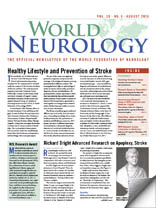The Research Group on Space and Underwater Neurology was primarily founded to coordinate studies about the influence of the weightlessness during space flights. After first experiences in the real micro gravity, it could be inferred that mainly the movement system was affected, without an essential influence on the cognitive abilities. The crew members in space stations can perform highest technical programs and difficult scientific projects. As main disturbances in the weightlessness, a dysfunction of the proprioceptive system, the reafference of motor control, was discovered. As a temporary disturbance after the return to the Earth’s atmosphere, the “Weightlessness Ataxia” was described by I.B. Kozlowskaya.
Oleg Georgevic Gazenko, the director of the Russian Space Medical Institute, introduced simulated micro gravity in the research program of weightlessness. The Bed Rest Method and the Dry Immersion System are used on volunteers, staying in a horizontal position, cared with all hygienic and nutritional support. With this method, specific scientific programs to study the weightlessness can be performed. As a main result of the different elaborated projects, the dysfunction of the proprioceptive system was confirmed.
In the transfer of the experimental results to clinical conditions, the symptoms of the Bed Rest Syndrome can be stated, showing a polyneuropathy with additional primary muscle atrophies and a posterior tract dysfunction. Clinically, the Bed Rest Syndrome causes great problems in chronic neurological conditions, especially in long-lasting coma states but also in progredient neurodegenerative diseases. Bed Rest Symptoms can be observed in heart disturbances and in elderly people. New methods have to be developed to prevent this secondary complication. The different methods are mainly elaborated from the countermeasures used in real weightlessness.
With the fMRI method, an activation of the sensorimotor regions after a stimulation of the proprioceptive system could be demonstrated. In the meantime, this method is established as a paradigm of fMRI to discover rest functions of conscious in post-coma states.
In the subdivision Underwater Neurology, a working group was established to introduce the scuba diving system in neurorehabilitation. Spasticity in mild spinal cord lesions and a disturbance of the vertebral spine can be successfully treated.
The hyperbaric oxygenation treatment (HBOT), until now called a stepchild, has the handicap to need high technical equipment with a specially trained crew. HBOT can be included in neurorehabilitation programs. Our group has initiated a cooperation with the Adeli Medical Center in Piestany, Slovakia. A treatment program to introduce HBOT for cerebral palsy and for patients with a vegetative state/apallic syndrome has been developed.
The program of the ARG Space and Underwater Neurology is focused on the research of the proprioceptive system and its disturbances. The main clinical project is the Bed Rest Syndrome in long-lasting bed lay conditions such as prolonged coma states as well as in chronic neurological diseases with reduced motoric activities. New methods in neurorehabilitation using stimulation of the proprioceptive system are in development. In HBOT, a cooperation with centers specializing in this method in neurological conditions is the goal.
